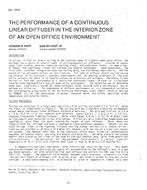From the viewpoint of a compressor manufacturer, suction accumulators are a mixed blessing. Applied properly, they can provide a very substantial degree of protection against those periods when liquid refrigerant flooding occurs due to a temporary loss of adequate liquid control. I suspect there have been no better salesmen for accumulators than compressor manufacturers for the past several years. But an accumulator ·is not a magic cure-all for every system refrigerant problem. On a field installed system, the selection procedure at best is a somewhat haphazard process which may not always achieve its desired results.
If we are to discuss accumulator application intelligently, we need first to have a clear understanding of just what limitations we must place on compressor exposure to liquid refrigerant in order to provide a reasonable degree of protection. A compressor is built to pump refrigerant vapor, not liquid suction and discharge valves can be stressed far beyond their intended design limits if subjected to liquid droplets in the vapor being pumped. But of far more concern is the effect of liquid return to the compressor on lubrication
An accumulator appears to be a simple device in its design concept – merely a reservoir to trap flooding refrigerant and feed it to the compressor at a rate which the compressor can tolerate. But in actual practice, it is not so simple.
Product Details
- Published:
- 1975
- Number of Pages:
- 3
- File Size:
- 1 file , 320 KB
- Product Code(s):
- D-AC-75-07-2
- Note:
- This product is unavailable in Russia, Belarus


